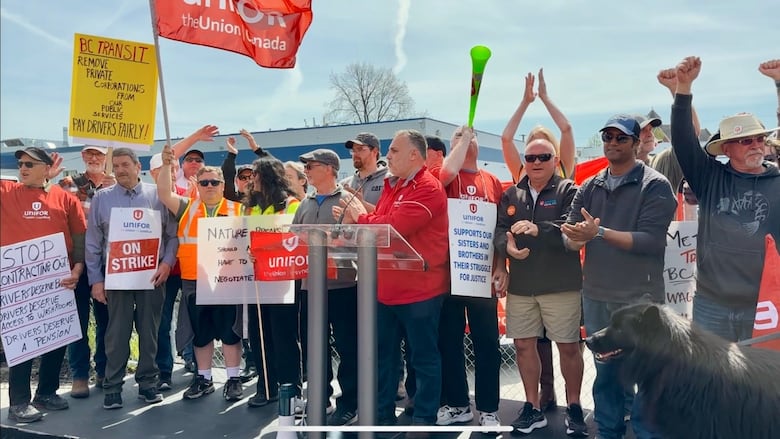Transit strike in Cowichan Valley now among longest in B.C. history
The province has appointed a mediator in the labour dispute, but so far no agreement has been reached

Transit drivers in the Cowichan Valley have been on strike for nearly five months, making it difficult for people in the region north of Victoria to get around.
At 138 days, it is now longer than the Sea-to-Sky Transit strike in 2022, which at the time was reported as the longest transit strike in B.C. history.
"This is getting to the point where it's just ridiculous," said Lise Haddock, the executive director of the Cowichan Valley Branch of the Canadian Mental Health Association, which provides social supports in the region.
Workers represented by Unifor locals 114 and 333 have been on strike since February in the valley of around 90,000 residents.
Haddock said it's the community's most vulnerable who are bearing the brunt of the strike.
For example, she said the CMHA is seeing a 25 to 50 per cent drop in the number of youth attending programs at their youth centre — many of whom are unhoused or living in foster care.
The youth rely on the youth centre to learn life skills, connect with mentors and peers, and access services.
Haddock doesn't just worry about youth that aren't coming to the centre — she's also worried about how they're getting around without the bus.
"We're really concerned about them, you know, looking at different alternatives to get home, or to get where they're staying, that could be unsafe."
Mickala Craig is also worried about vulnerable transit users.
She's a homeshare provider, supporting a woman with Down syndrome who also has early onset dementia and normally uses handyDART, an accessible transit service, to go to and from her day program on weekdays.
Craig is able to miss some work in order to drive her, but she knows not everyone is as flexible.

She also points out that the Cowichan Valley is vast — so even people who don't need extra support are having a tough time getting around.
"Not everybody has a car. Not everybody has a bike … so how are those people getting to work?"
"If you live in Chemainus and you work in Duncan, are you walking that?"
Chemainus is 17 kilometres north of Duncan, along the busy Trans-Canada Highway.
The Cowichan Valley transit system covers more than 45 kilometres, north to south.
Union, employer, unable to come to agreement
Negotiators for Unifor locals 114 and 333 did reach a deal with their employer Transdev in April, but the deal was voted down by members.
On June 10, B.C. Labour Minister Jennifer Whiteside appointed a mediator, Dave Schaub, and called on both parties to work with him.
No deal has been reached, but both Trandsev and Unifor told CBC News they've made submissions and are awaiting recommendations from the mediator.
Union members are demanding higher wages, scheduled washroom breaks, and access to private washrooms.


